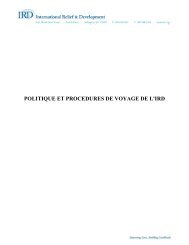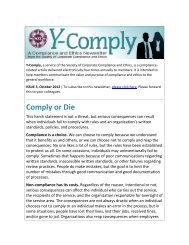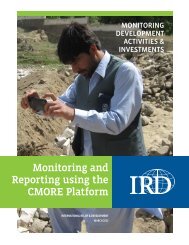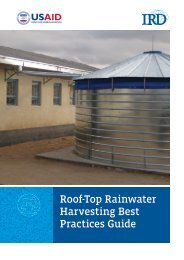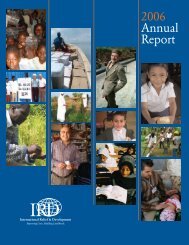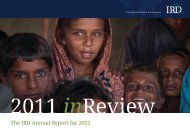Empowering citizens Engaging governments Rebuilding communities
Empowering citizens Engaging governments Rebuilding communities
Empowering citizens Engaging governments Rebuilding communities
Create successful ePaper yourself
Turn your PDF publications into a flip-book with our unique Google optimized e-Paper software.
Dr. Noor Abdul Aziz Baqir’s grant covered<br />
$3,800 worth of equipment, and it<br />
allowed her to quickly begin rebuilding<br />
her clinic, which was an important<br />
show of faith for her 19 workers<br />
3<br />
Successes and setbacks<br />
felt that the whole world was destroyed, my dreams<br />
and my life were destroyed,” said Dr. Noor Abdul Aziz<br />
Baqir, a dentist whose clinic had been at the market<br />
since 1983. “As I went to see my clinic, I felt, ‘This<br />
is the end of my career as a dentist.’ I couldn’t afford<br />
to reopen it.” Baqir’s grant covered $3,800 worth of<br />
equipment, and it allowed her to quickly begin rebuilding,<br />
which was an important show of faith for her 19<br />
workers.<br />
Reopening destroyed commercial districts like Sadriya<br />
often got high priority because of their visibility and<br />
importance to the community, but fast turnarounds<br />
like the quick grant Baqir received were not common.<br />
Given the intensive monitoring of the grant development<br />
and implementation process, a gap between the<br />
conception and execution of a grant was common. The<br />
minimum length was two months, but six months was<br />
the average. Still, the final evaluation of the program,<br />
conducted by International Business & Technical<br />
Consultants, Inc. (IBTCI), noted the important role that<br />
development grants played in the COIN effort to quickly<br />
normalize <strong>communities</strong> struck by sudden violence.<br />
kind of normalcy necessary to stabilize a community.<br />
“The small grants program worked very well because<br />
that got the businesses owners back,” Gartner said.<br />
“They wanted their shops back but they didn’t have any<br />
money to pay for all that damage, and besides, would<br />
you invest in reopening your shop? There’s a war going<br />
on. So here we are, encouraging them to come out and<br />
just provide us proof that they own it and will work at it.”<br />
When her dental clinic was destroyed, Baqir said she<br />
felt just like that. She wasn’t sure how she would<br />
continue to support her immediate and extended<br />
family, much less rebuild her destroyed business. But<br />
just one day after the bombing, when the two IRD staff<br />
approached her as she sifted through the rubble, she<br />
said her outlook changed, just that quickly. “I felt like<br />
there was a light at the end of the tunnel,” she said,<br />
not long after her clinic reopened—“in spite of the<br />
misery and sadness.”<br />
Vocational training: “A sustainable program<br />
when we left”<br />
44<br />
By the end of the program, the business development<br />
component had generated 74 percent of the 57,109<br />
long-term jobs documented by CSP. Even with the<br />
lengthy startup time between application and award,<br />
the grants program actually produced most jobs fairly<br />
quickly. Approximately 25,000 jobs were created in<br />
the first two years. Trade and service sector grants<br />
were found to be the most efficient at enabling this<br />
duality—quick-impact yet longer term employment<br />
opportunities, which proved to be extremely supportive<br />
of the COIN strategy.<br />
While they offered fewer macro links with the rest of the<br />
economy than did small-scale manufacturing or agribusiness<br />
grants, and though administering and monitoring<br />
them occasionally proved problematic, these grants<br />
resonated profoundly with Iraqis, offering a path to the<br />
In January 2009, IRD and USAID officers officially<br />
handed over administration of Iraq’s rebuilt vocational<br />
training program to the government’s Ministry of<br />
Labor and Social Affairs (MOLSA). The event coincided<br />
with the graduation ceremony for trainees in CSPsponsored<br />
courses at the Waziriya training facility in<br />
Baghdad. Ministry officials lauded IRD for rehabilitating<br />
the facility and restarting training programs. The<br />
handover was significant because it completed the<br />
swift rebirth of Iraq’s ability to create a sustainable<br />
workforce at the community level. In 2006, one year<br />
before CSP’s direct support, the ministry graduated<br />
7,000 vocational trainees. In 2007, after one year<br />
with CSP’s support, the number of graduates soared<br />
past 20,000. “We had to work through the ministry to<br />
achieve our targets, but we basically built their capacity<br />
to provide continuing training,” said Iqbal al-Juboori,


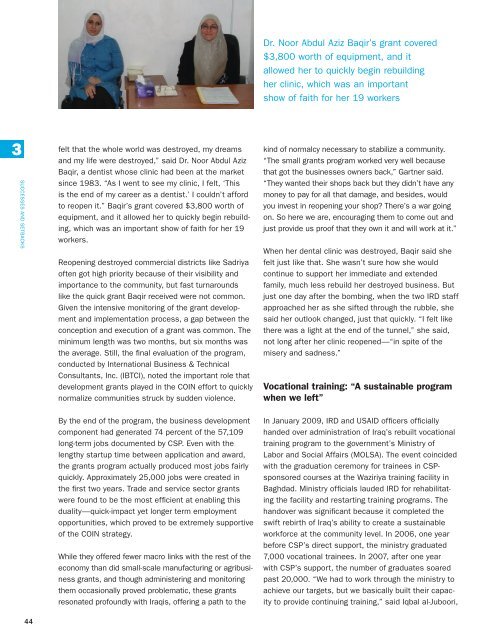
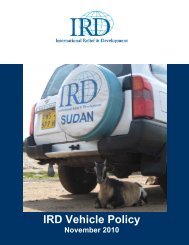
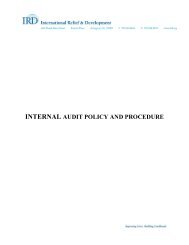
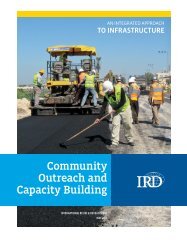
![Guide bonne pratique production d'oignon qualité_VF_4_2411012[1]](https://img.yumpu.com/23506639/1/184x260/guide-bonne-pratique-production-doignon-qualitac-vf-4-24110121.jpg?quality=85)
